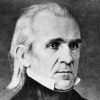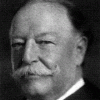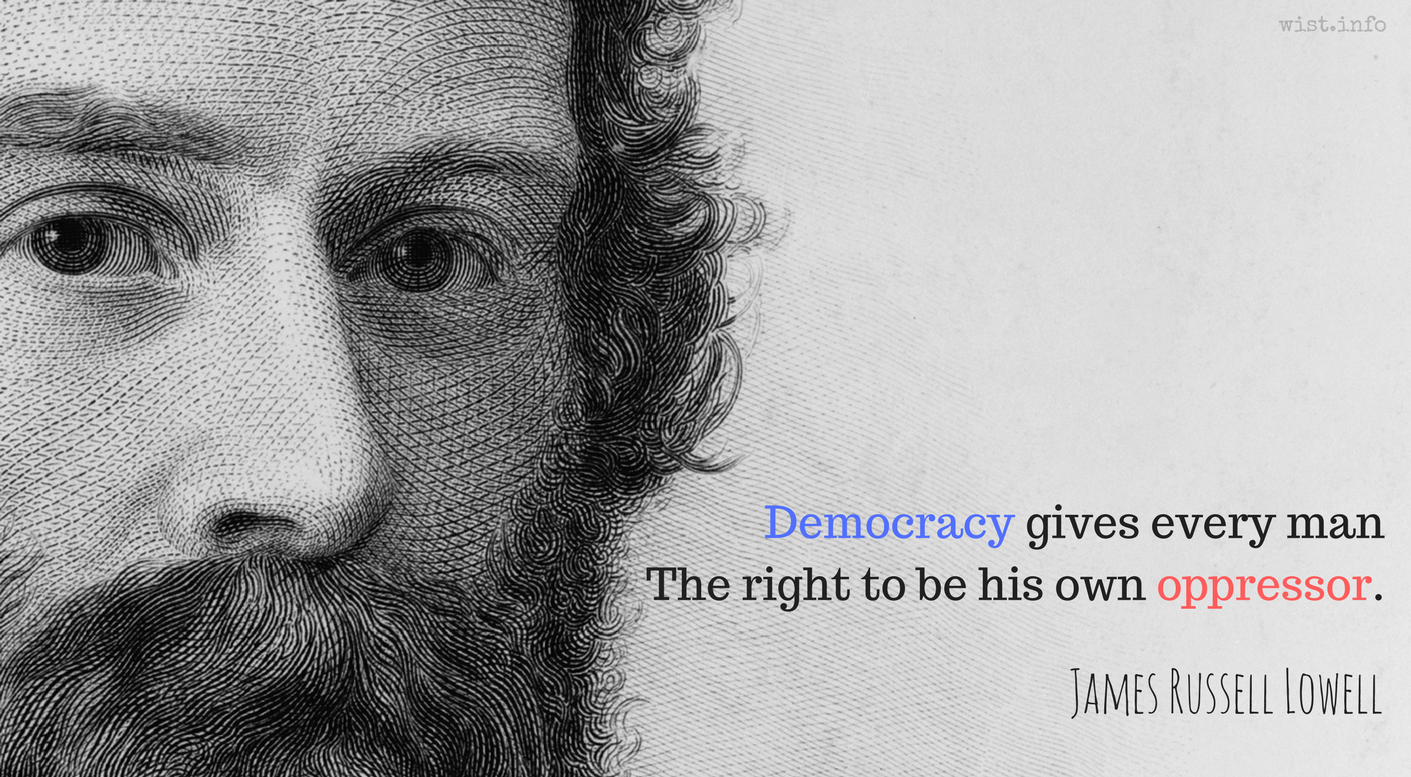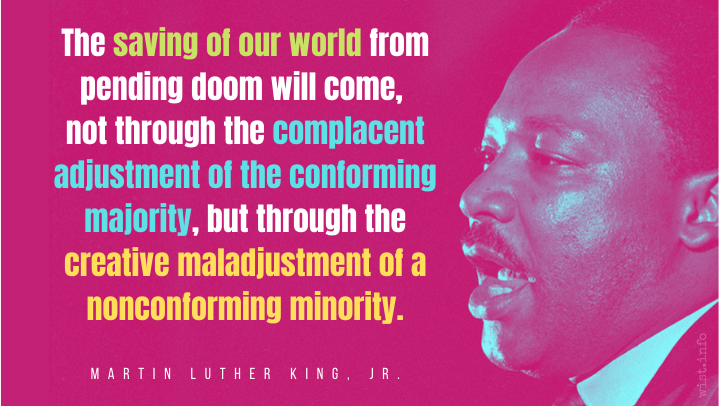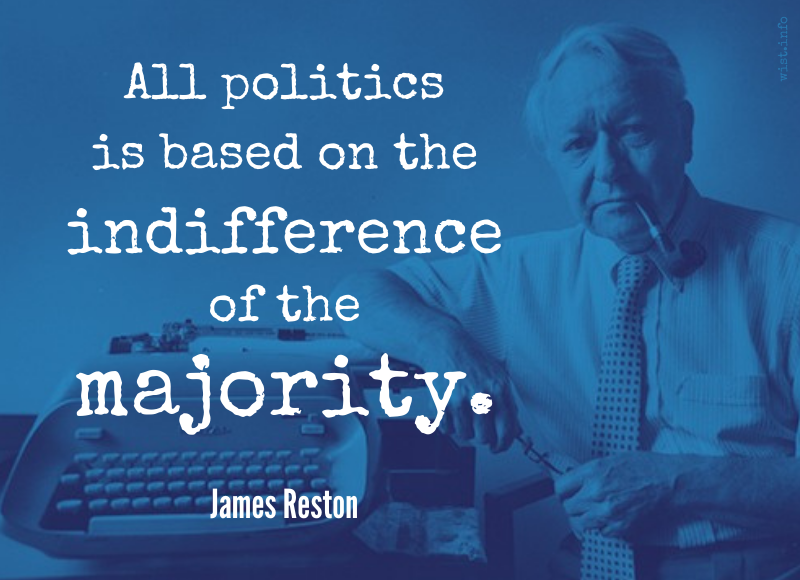Most people are not even aware of their need to conform. They live under the illusion that they follow their own ideas and inclinations, that they are individualists, that they have arrived at their opinions as the result of their own thinking — and that it just happens that their ideas are the same as those of the majority. The consensus of all serves as a proof for the correctness of “their” ideas.
Erich Fromm (1900-1980) American psychoanalyst and social philosopher
The Art of Loving, ch. 2 (1956)
(Source)
Quotations about:
majority
Note not all quotations have been tagged, so Search may find additional quotes on this topic.
Don’t be seduc’d by a Multitude. Thou wilt stand alone when thou diest; and shalt be call’d to give thy Account by thyself.
Thomas Fuller (1654-1734) English physician, preacher, aphorist, writer
Introductio ad Prudentiam, Vol. 2, # 2087 (1727)
(Source)
It is customary to suppose that, if a belief is widespread, there must be something reasonable about it. I do not think this view can be held by anyone who has studied history. Practically all the beliefs of savages are absurd. In early civilizations there may be as much as one percent for which there is something to be said. In our own day …. But at this point I must be careful. We all know that there are absurd beliefs in Soviet Russia. If we are Protestants, we know that there are absurd beliefs among Catholics. If we are Catholics, we know that there are absurd beliefs among Protestants. If we are Conservatives, we are amazed by the superstitions to be found in the Labour Party. If we are Socialists, we are aghast at the credulity of Conservatives. I do not know, dear reader, what your beliefs may be, but whatever they may be, you must concede that nine-tenths of the beliefs of nine-tenths of mankind are totally irrational. The beliefs in question are, of course, those which you do not hold.
Bertrand Russell (1872-1970) English mathematician and philosopher
“Is There a God?” (1952)
(Source)
Essay commissioned by Illustrated magazine in 1952, but never published there. First publication in Russell, Last Philosophical Testament, 1943-68 (1997) [ed. Slater/Köllner].
If you reside in a state where you attain your legal majority while still in your teens, pretend that you don’t. There isn’t an adult alive who would want to be contractually bound by a decision he came to at the age of nineteen.
Fran Lebowitz (b. 1950) American journalist, essayist
“Tips for Teens,” Social Studies (1981)
(Source)
When the whole world is running towards a cliff, he who is running in the opposite direction appears to have lost his mind.
The majority always has its way in the end. So does the undertaker. But neither gains in pleasantness by the fact.
H. L. Mencken (1880-1956) American writer and journalist [Henry Lewis Mencken]
A Little Book in C Major, ch. 3, § 11 (1916)
(Source)
Ninety percent of everything is crud.
Theodore Sturgeon (1918-1985) American fiction author, poet, essayist, critic [b. Edward Hamilton Waldo]
“Sturgeon’s Law” (c. 1951)
Popularly known as "Sturgeon's Law," though the author used that term for another aphorism, and called this "Sturgeon's Revelation."
Verbal origins point to a talk at NYU in 1951, and at the World SF Convention, Philadelphia (Sep 1953). It was first referenced in print in Venture Science Fiction (Sep 1957), and first used by Sturgeon in print in his review column, "Books: On Hand," Venture Science Fiction (Mar 1958):It is in this vein that I repeat Sturgeon's Revelation, which was wrung out of me after twenty years of wearying defense of science fiction against attacks of people who used the worst examples of the field for ammunition, and whose conclusion was that ninety percent of S.F. is crud.
The Revelation
Ninety percent of everything is crud.
Corollary 1
The existence of immense quantities of trash in science fiction is admitted and it is regrettable; but it is no more unnatural than the existence of trash anywhere.
Corollary 2
The best science fiction is as good as the best fiction in any field.
For "crud" people often substitute "crap" or "shit." People citing the law sometimes vary the percentage value as well.
More discussion:
Thinking is difficult, therefore let the herd pronounce judgment!
Carl Jung (1875-1961) Swiss psychologist
Flying Saucers: A Modern Myth of Things Seen in the Skies, ch. 2 (1959) [tr. Hull]
(Source)
The motto of the "relatively unconscious man" who "clings to the commonplace, the obvious, the probable, the collectively valid." Reprinted in the The Collected Works of C.G. Jung - Civilization in Transition, vol. 10, ¶ 653.
Probable source of the frequently-attributed (but unfound) "Thinking is difficult. That's why most people judge."
Count heads. That is what matters in all things. When you must, follow the common taste, and make your way toward eminence. The wise should adapt themselves to the present, even when the past seems more attractive, both in the clothes of the soul and of the body. This rule for living holds for everything but goodness, for one must always practice virtue.
[El gusto de las cabeças haze voto en cada orden de cosas. Ésse se ha de seguir por entonces, y adelantar a eminencia. Acomódese el cuerdo a lo presente, aunque le parezca mejor lo pasado, así en los arreos del alma como del cuerpo. Sólo en la bondad no vale esta regla de vivir, que siempre se ha de practicar la virtud.]
Baltasar Gracián y Morales (1601-1658) Spanish Jesuit priest, writer, philosopher
The Art of Worldly Wisdom [Oráculo Manual y Arte de Prudencia], § 120 (1647) [tr. Maurer (1992)]
(Source)
(Source (Spanish)). Alternate translations:Let a prudent man accommodate himself to the present, whether as to body, or mind, though the past may even seem better unto him. In manners onely that rule is not to be observed, seeing vertue is at all times to be practised.
[Flesher ed. (1685)]In everything the taste of the many carries the votes; for the time being one must follow it in the hope of leading it to higher things. In the adornment of the body as of the mind adapt yourself to the present, even though the past appear better. But this rule does not apply to kindness, for goodness is for all time.
[tr. Jacobs (1892)]The choice of the many carries the vote in every field. For the time being, therefore, it must be bowed to, in order to bring it to higher level: the man of wisdom accommodates himself to the present, even though the past seems better, alike in the dress of his spirit, as in the dress of his body. Only in the matter of being decent does this rule of life not apply, for virtue should be practiced eternally.
[tr. Fischer (1937)]
Do nine tenants in a residential building have the right to place the dumpsters in front of the tenth tenant’s door? Seemingly, they enjoy a clear majority. But the role of democracy is not only to assure the governance of the majority, but to protect the rights of the minority.
Yoel Esteron (b. 1956) Israeli journalist, publisher
“Who’s for destroying democracy?” Ynetnews (14 Feb 2016)
(Source)
And yet a majority vote is worthless as a proof of truths that are at all difficult to discover; for a single man is much more likely to hit upon them than a group of people. I was, then, unable to choose anyone whose opinions struck me as preferable to those of all others, and I found myself as it were forced to become my own guide.
[Et que néanmoins la pluralité des voix n’est pas une preuve qui vaille rien, pour les vérités un peu malaisées à découvrir, à cause qu’il est bien plus vraisemblable qu’un homme seul les ait rencontrées que tout un peuple; je ne pouvois choisir personne dont les opinions me semblassent devoir être préférées à celles des autres, et je me trouvai comme contraint d’entreprendre moi-même de me conduire.]
René Descartes (1596-1650) French philosopher, mathematician
Discourse on Method [Discours de la méthode], Part 2 (1637) [tr. Cottingham, Stoothoff (1985)]
(Source)
(Source (French)). Alternate translations:Notwithstanding that plurality of voices is a proof of no validity, in those truths which are hard to be discovered; for that it’s much more likely for one man alone to have met with them, then a whole Nation; I could choose no Man whose opinion was to be preferr’d before anothers: And I found my self even constrain’d to undertake the conduct of my self.
[tr. Newcombe ed. (1649)]Although such be the ground of our opinions, I remarked that a plurality of suffrages is no guarantee of truth where it is at all of difficult discovery, as in such cases it is much more likely that it will be found by one than by many. I could, however, select from the crowd no one whose opinions seemed worthy of preference, and thus I found myself constrained, as it were, to use my own reason in the conduct of my life.
[tr. Veitch (1901)]Yet in spite of this the voice of the majority does not afford a proof of any value in truths a little difficult to discover, because such truths are much more likely to have been discovered by one man than by a nation. I could not, however, put my finger on a single person whose opinions seemed preferable to those of others, and I found that I was, so to speak, constrained myself to undertake the direction of my procedure.
[tr. Haldane & Ross (1911)]
Even in their appeal to “custom” they accomplish nothing. To constrain us to yield to custom would be to treat us most unjustly. Indeed, if men’s judgments were right, custom should have been sought of good men. But it often happens far otherwise: what is seen being done by the many soon obtains the force of custom; while the affairs of men have scarcely ever been so well regulated that the better things pleased the majority. Therefore, the private vices of the many have often caused public error, or rather a general agreement on vices, which these good men now want to make law.
John Calvin (1509-1564) French theologian and reformer
The Institutes of the Christian Religion [Christianae Religionis Institutio], Preface, sec. 5 (1536) [tr. Battles (1960]
(Source)
Alternate translation:Then, again, it is to no purpose they call us to the bar of custom. To make every thing yield to custom would be to do the greatest injustice. Were the judgments of mankind correct, custom would be regulated by the good. But it is often far otherwise in point of fact; for, whatever the many are seen to do, forthwith obtains the force of custom. But human affairs have scarcely ever been so happily constituted as that the better course pleased the greater number. Hence the private vices of the multitude have generally resulted in public error, or rawther that common consent in vice which these worthy men would have to be law.
[tr. Beveridge (1845)]
In this and like communities, public sentiment is everything. With public sentiment, nothing can fail; without it, nothing can succeed. Consequently, he who moulds public sentiment goes deeper than he who enacts statutes or pronounces decisions. He makes statutes and decisions possible or impossible to be executed.
Democracy is two wolves and a lamb voting on what to have for lunch.
Benjamin Franklin (1706-1790) American statesman, scientist, philosopher, aphorist
(Spurious)
Frequently attributed to Franklin, but not found in his writing (and the word "lunch" dates only back to the 1820s). The phrase is only found in sources dating back to the early 1990s, e.g.,
- "Democracy is like two wolves and a lamb deciding on what they want for dinner." [Shelby Foote in Ken Burns, Civil War (1990)]
- "Democracy has been described as four wolves and a lamb voting on what to have for lunch." [Los Angeles Times (25 Nov 1990)]
- "Democracy is not freedom. Democracy is two wolves and a lamb voting on what to eat for lunch. Freedom comes from the recognition of certain rights which may not be taken, not even by a 99% vote." [Marvin Simkin, Los Angeles Times (1992)]
- "Democracy must be something more than two wolves and a sheep voting on what to have for dinner." [James Bovard, Lost Rights, "Conclusion" (1994)]
The surest defense against Evil is extreme individualism, originality of thinking, whimsicality, even — if you will — eccentricity. That is, something that can’t be feigned, faked, imitated; something even a seasoned imposter couldn’t be happy with. Something, in other words, that can’t be shared, like your own skin: not even by a minority. Evil is a sucker for solidity. It always goes for big numbers, for confident granite, for ideological purity, for drilled armies and balanced sheets. Its proclivity for such things has to do with its innate insecurity, but this realization, again, is of small comfort when Evil triumphs.
Joseph Brodsky (1940-1996) Russian-American poet, essayist, Nobel laureate, US Poet Laureate [Iosif Aleksandrovič Brodskij]
Commencement Address, Williams College (24 May 1984)
(Source)
By the theory of our Government majorities rule, but this right is not an arbitrary or unlimited one. It is a right to be exercised in subordination to the Constitution and in conformity to it. One great object of the Constitution was to restrain majorities from oppressing minorities or encroaching upon their just rights. Minorities have a right to appeal to the Constitution as a shield against such oppression.
James K. Polk (1795-1849) American lawyer, politician, US President (1845-1849)
Inaugural Address (4 Mar 1845)
(Source)
The one pervading evil of democracy is the tyranny of the majority, or rather of that party, not always the majority, that succeeds, by force or fraud, in carrying elections.
John Dalberg, Lord Acton (1834-1902) British historian, politician, writer
“Review of Sir Erskine May’s Democracy in Europe,” The Quarterly Review (1878-01)
(Source)
No honest, clear-headed man, however great a lover of popular government, can deny that the unbridled expression of the majority of a community converted hastily into law or action would sometimes make a government tyrannical and cruel. Constitutions are checks upon the hasty action of the majority. They are the self-imposed restraints of a whole people upon a majority of them to secure sober action and a respect for the rights of the minority.
William Howard Taft (1857-1930) US President (1909-13) and Chief Justice (1921-1930)
Veto Statement for the Arizona Enabling Act (15 Aug 1911)
(Source)
Taft vetoed the admission of Arizona to the US with a state constitution that allowed popular recall of judges.
The rule which should guide us in such cases is simple and obvious enough: that the aggregate testimony of our neighbours is subject to the same conditions as the testimony of any one of them. Namely, we have no right to believe a thing true because everybody says so unless there are good grounds for believing that some one person at least has the means of knowing what is true, and is speaking the truth so far as he knows it. However many nations and generations of men are brought into the witness-box, they cannot testify to anything which they do not know. Every man who has accepted the statement from somebody else, without himself testing and verifying it, is out of court; his word is worth nothing at all. And when we get back at last to the true birth and beginning of the statement, two serious questions must be disposed of in regard to him who first made it: was he mistaken in thinking that he knew about this matter, or was he lying?
William Kingdon Clifford (1845-1879) English mathematician and philosopher
“The Ethics of Belief,” Part 2 “The Weight of Authority,” Contemporary Review (Jan 1877)
(Source)
The validity of an idea or action is determined not by whether it is widely believed or widely reviled but by whether it obeys the rules of logic. It is not because an argument is denounced by a majority that it is wrong nor, for those drawn to heroic defiance, that it is right.
Conscience and the press ought to be unrestrained, not because men have a right to deviate from the exact line that duty prescribes, but because society, the aggregate of individuals, has no right to assume the prerogative of an infallible judge, and to undertake authoritatively to prescribe to its members in matters of pure speculation.
William Godwin (1756-1836) English journalist, political philosopher, novelist
Enquiry Concerning Political Justice, Book 2, ch. 5 (1793)
(Source)
It is safe to wager that every public idea and every accepted convention is sheer foolishness, because it has suited the majority.
[Il y a à parier que toute idée publique, toute convention reçue, est une sottise, car elle a convenu au plus grand nombre.]
Nicolas Chamfort (1741-1794) French writer, epigrammist (b. Nicolas-Sébastien Roch)
Products of Perfected Civilization [Produits de la Civilisation Perfectionée], Part 1 “Maxims and Thoughts [Maximes et Pensées],” ch. 2, ¶ 130 (1795) [tr. Mathers (1926)]
(Source)
(Source (French)). Alternate translations:It may be argued that every public idea, every accepted convention, is a piece of stupidity, for has it not commended itself to the greatest number?
[tr. Hutchinson (1902), "The Cynic's Breviary"]One can be certain that every generally held idea, every received notion, will be an idiocy, because it has been able to appeal to a majority.
[In Botton, Status Anxiety (2004)]It is likely that every public idea, every received convention, is folly, because the majority of men consented to it.
[Siniscalchi (1994)]
The truth is always in the minority, and the minority is always stronger than the majority, because as a rule the minority is made up of those who actually have an opinion, while the strength of the majority is illusory, formed of that crowd which has no opinion — and which therefore the next moment (when it becomes clear that the minority is the stronger) adopts the latter’s opinion, which now is in the majority, i.e., becomes rubbish by having the whole retinue and numerousness on its side, while the truth is again in a new minority.
Idiosyncratic belief systems which are shared by only a few adherents are likely to be regarded as delusional. Belief systems which may be just as irrational but which are shared by millions are called world religions. When comparing the beliefs held by psychotics with the religious beliefs held by normal people, it is impossible to say that one set of beliefs is delusional while the other is sane.
Anthony Storr (1920-2001) English psychiatrist and author
Feet of Clay: Saints, Sinners and Madmen, ch. 10 (1996)
(Source)
I know your race. It is made up of sheep. It is governed by minorities, seldom or never by majorities. It suppresses its feelings and its beliefs and follows the handful that makes the most noise. Sometimes the noisy handful is right, sometimes wrong; but no matter, the crowd follows it. The vast majority of the race, whether savage or civilized, are secretly kind-hearted and shrink from inflicting pain, but in the presence of the aggressive and pitiless minority they don’t dare to assert themselves. Think of it! One kind-hearted creature spies upon another, and sees to it that he loyally helps in iniquities which revolt both of them. Speaking as an expert, I know that ninety-nine out of a hundred of your race were strongly against the killing of witches when that foolishness was first agitated by a handful of pious lunatics in the long ago. And I know that even to-day, after ages of transmitted prejudice and silly teaching, only one person in twenty puts any real heart into the harrying of a witch. And yet apparently everybody hates witches and wants them killed. Some day a handful will rise up on the other side and make the most noise — perhaps even a single daring man with a big voice and a determined front will do it — and in a week all the sheep will wheel and follow him, and witch-hunting will come to a sudden end.
If forty million people say a foolish thing it does not become a wise one, but the wise man is foolish to give them the lie.
W. Somerset Maugham (1874-1965) English novelist and playwright [William Somerset Maugham]
A Writer’s Notebook (1949)
An entry dated 1901. More discussion about this quotation: If Fifty Million People Say a Foolish Thing, It Is Still a Foolish Thing – Quote Investigator
It is difficult for a majority to see, let alone sympathize with, a practice that discriminates against a minority. It’s not unlike trying to get a fish to understand the concept of water! It is simply the medium in which the fish resides, requiring no cognition of the water that supports it. Discrimination — not just individual, but systemic — is the “water” in which the majority swims, and unless something happens to bring that discrimination into the view and consciousness of the majority, nothing will change, because the majority hardly, if ever, notices it.
All, too, will bear in mind this sacred principle, that though the will of the majority is in all cases to prevail, that will to be rightful must be reasonable; that the minority possess their equal rights, which equal law must protect, and to violate would be oppression.
Thomas Jefferson (1743-1826) American political philosopher, polymath, statesman, US President (1801-09)
Speech (1801-03-14), Inaugural Address, Washington, D. C.
(Source)
NORFOLK: I’m not a scholar, as Master Cromwell never tires of pointing out, and frankly I don’t know whether the marriage was lawful or not. But damn it, Thomas, look at those names … You know those men! Can’t you do what I did, and come with us, for friendship?
MORE: And when we stand before God, and you are sent to Paradise for doing according to your conscience, and I am damned for not doing according to mine, will you come with me, for friendship?
Robert Bolt (1924-1995) English dramatist
A Man for All Seasons, play, Act 2 (1960)
(Source)
In Bolt's 1966 film adaptation, this is shortened:NORFOLK: I'm not a scholar, I don't know whether the marriage was lawful or not. But damn it, Thomas, look at these names! Why can't you do as I did, and come with us, for fellowship?
MORE: And when we die, and you are sent to heaven for doing your conscience, and I am sent to hell for not doing mine, will you come with me, for fellowship?
The saving of our world from pending doom will come, not through the complacent adjustment of the conforming majority, but through the creative maladjustment of a nonconforming minority.
Martin Luther King, Jr. (1929-1968) American clergyman, civil rights leader, social activist, preacher
Strength to Love, ch. 2 “Transformed Nonconformist,” sec. 3 (1963)
(Source)
True Christianity never shields itself behind majorities. Nero, and the other persecuting Roman emperors, were amply supported by majorities; and yet the pure and peaceable religion of Christ in the end triumphed over them all; and it was only when it attempted itself to enforce religion by the arm of authority, that it began to wane. A form of religion that can not live under equal and impartial laws ought to die, and sooner or later must die.
John Welch (1805-1891) American politician, jurist
Board of Education of Cincinnati v. Minor, Ohio Supreme Court (1872)
(Source)
Do as most do; and few will speak ill of thee.
Thomas Fuller (1654-1734) English physician, preacher, aphorist, writer
Introductio ad Prudentiam, Vol. 1, # 135 (1725)
(Source)
All politics is based on the indifference of the majority.
James "Scotty" Reston (1909-1995) Scottish-American journalist and editor
“New York: Rockefeller Comes Out of His Trance,” New York Times (12 Jun 1968)
(Source)
This is cited in multiple places to this 1968 op-ed, to which I don't have access. Reston also used the phrase in this 1972 op-ed.
If fifty million people say a foolish thing, it is still a foolish thing.
[Si 50 millions de personnes disent une bêtise, c’est quand même une bêtise.]
Anatole France (1844-1924) French poet, journalist, novelist, Nobel Laureate [pseud. of Jaques-Anatole-François Thibault]
(Spurious)
Sometimes also misattributed to Bertrand Russell. The closest to this specific quotation comes from W. Somerset Maugham. More information about this quotation, including the source of this misattribution and an analogous phrase France did use: If Fifty Million People Say a Foolish Thing, It Is Still a Foolish Thing – Quote Investigator.
If all mankind, minus one, were of one opinion, and only one person were of the contrary opinion, mankind would be no more justified in silencing that one person, than he, if he had the power, would be justified in silencing mankind.
John Stuart Mill (1806-1873) English philosopher and economist
On Liberty, ch. 2 “Of the Liberty of Thought and Discussion” (1859)
(Source)
The object in life is not to be on the side of the majority, but to escape finding oneself in the ranks of the insane.
Marcus Aurelius (AD 121-180) Roman emperor (161-180), Stoic philosopher
(Spurious)
(Source)
The earliest identifiable citation appears as an epigraph to Leo Tolstoy, Bethink Yourselves!, ch. 8 (1904), in Recollections & Essays [tr. Aylmer Maud (1937)]. A cleaner copy can be found at the Nonresistance.org site. The classic (and presumably abridged) version of Bethink Yourselves!, as translated by Chertkov (1904), does not include any of the copious epigraphs, including this one.
Regardless, this phrase is not clearly found in Marcus Aurelius' Meditations, though other parts of the lengthy epigraph appear to be. If ordered by position, this would presumably fall somewhere from 10.6 to 10.8 (i.e., the preceding and following sentences are more clearly identifiable), but the language of this sentence does not seem to line up.
Since freedom of opinion can only exist when the government thinks itself secure, it is important that the government should have the approval of the great majority of the population and should deal with discontented minorities, wherever possible, in a manner calculated to allay their discontent. A government must possess force, but cannot be a satisfactory government unless force is seldom necessary.
Bertrand Russell (1872-1970) English mathematician and philosopher
“Freedom and Government,” in Ruth Nanda Anshen, ed., Freedom: Its Meaning (1940)
(Source)
Democracy is the recurrent suspicion that more than half of the people are right more than half of the time.
E. B. White (1899-1985) American author, critic, humorist [Elwyn Brooks White]
“Notes and Comments,” New Yorker (3 Jul 1943)
(Source)
A majority held in restraint by constitutional checks and limitations, and always changing easily with deliberate changes of popular opinions and sentiments, is the only true sovereign of a free people. Whoever rejects it does of necessity fly to anarchy or to despotism.
Abraham Lincoln (1809-1865) American lawyer, politician, US President (1861-65)
Speech (1861-03-04), Inaugural Address, Washington, D. C.
(Source)
















